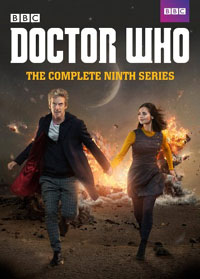DVD Extras for this story on the 14-episode box sets include:
What went wrong? Essentially, it's all a question of basic content going out of sync with my own taste, and out of sync with what I consider emotionally healthy courses of action.
Backyard TrapFirst off is Dollard's own concept pitch of the "trap street", which apparently Steven Moffat was VERY excited about. It's not a bad idea actually, and I think the actual take that the finished script has on the idea smooths it into a plausible reality better than anything said about it on any of the extras. BUT, think about what kind of story this concept will naturally produce all on its own: Ye olde Earthly backyard-alien-of-the-week, which is just far too overdone on Doctor Who to get me excited anymore. I don't think we can even call it a story twist anymore - it's now the new standard. You can pretty much guess "aliens on Earth" for each and every episode of Doctor Who now, and at least 60-70% of the time, you'd be right.To be fair, Dollard basically does something special and/or quite solid with each scene that comes up in her script to keep each one entertaining, but my feeling is that these scenes are working twice as hard as they should have to, just to combat the dullness of a premise that's been covered too many times already in so many other ways. The "trap street" doesn't come up quite as an original concept, but as new window-dressing detail for a rather old and worn-out concept. Bizarrely, one of the best scenes dealing most directly with the trap street concept appears to have hit the cutting room floor. Check out the deleted scenes for that. I seem to remember being pleased that Ashildr showed up to play a big role in this one, as another chapter in her saga would be welcome. However, I didn't feel that this story really explored her character well. She seemed to be repeating earlier mistakes and not learning from her experiences. Ultimately, this was my least favourite episode featuring her this season. The aliens that we meet in this episode aren't really very exciting either, although the glitching camouflage for most of them was a nice touch. Those that we'd seen before in the show usually had much more interesting, exciting episodes elsewhere, while those that were new were weird in ways that didn't really inspire or intrigue.
Bargain High for SappinessThough the episode's mystery was fairly decent and solid, it doesn't truly breathe before being choked off and upstaged by some of my least favourite types of humanoid behaviour. One of the most insidious and still widely-accepted of those behaviours is the concept of buying your way out of a problem, while I prefer to be a strong advocate of the concept of thinking your way to the solution to a problem. The unhealthy bargaining debuts here in a classic scene most of us will recognize from many previous dramas, with an elderly wife saying essentially - "Take me, not my husband!" Normally, sentiments like this are quickly gone with the wind and don't impact a story, largely because mechanisms for making such bartering work don't exist in reality and are thus highly implausible in fiction. But this time, this age-old infamous bargaining fantasy becomes both a major clue and a big developing plot point. Ick. Not a good way to go, methinks.In fact, the excessive sacrificial bargaining that takes over the end of this episode becomes its ultimate undoing with me as a viewer. Despite Clara's labeling of her own big bargain as "strategy", bargains are really the only type of solution any of the four protagonists propose or consider for the one problem which they are all agreed upon - Clara's survival. It doesn't really feel to me like they are inhabiting their own characters to be limited in that way. I'm going to go a bit Steven Covey at this point, to say that, in the terms of the fourth of his Seven Habits of Highly Effective People, the kind of sacrificial bargaining to which I am referring exemplifies the "Lose/Win" type of outcome. In other words, the thought is I must lose so that the other person can win. Here, stepping up to the plate translates into paying the price and surrendering - in the belief that someone else benefits, - and attempting to be at your emotional best in the process. In the case of "Face the Raven", there's a ton of time, energy, and drama poured into the emotional sentiments, which I thought to be an excessive amount of maudlin sentiment. There's about twice as much there as I could stomach, all getting way too sappy for my tastes, and it felt a bit weird that the characters would psychoanalyze each other with so much depth and clarity in so little time. What was really striking was what went missing during all of this, the thing that the Doctor has proven himself so good at in stories like "Mummy on the Orient Express" (story no. 254), and which Clara apparently learned and successfully implemented in "Flatline" (story no. 255) - and that is the idea to aim for the "Win/Win" solution, which often comes from thinking your way out of a problem, and digging deep into what the other party REALLY wants... especially because in reality, sacrificing yourself needs one heck of an unusual mechanism before anyone else really gets any benefit out of it. As is always the case whenever anyone suffers tragedy, the circumstances receive extra scrutiny, and a flood of what-if's descend upon everyone's actions and decisions leading up to the event. I think a lot of viewers will be really thinking about the circumstances of this event and, if they're like me, won't necessarily be finding it satisfyingly plausible. The concept that the bargains could actually work is not something that I believe is borne out by most actual situations, but of course here the validity of bargaining has been baked into the universe in which Dollard's story takes place. Does the concept of a "quantum shade" work? Is it plausible? I've begun to wonder lately if today's scientific notion of particles in quantum entanglement with each other, which can directly influence each other regardless of their separation in time and space, might provide a practical mechanism for telepathy to work. Perhaps a quantum shade operates by a similar principle? If so, it is unlikely that it would physically appear as a raven chasing you or a cloud of black smoke enveloping you, but then this is adventure in a telecinematic medium, so you have to physicalize/externalize the idea so that you have something to photograph. The "passing it on" part of its function, which is the mechanism for much of the show's bargaining, is that plausible? Telepathy can have a way of reaching unintended receivers, if they tune themselves in on the right frequency... but if we start to take into account the slipperiness and general unreliability of telepathy, and say that the quantum shade uses very similar mechanisms, it's unlikely it would have the pinpoint accuracy necessary to be in any way effective as a judiciary punishment with such rigidly defined operating rules, helping humanoids maintain their rigidly defined social rules. Into this, we have to somehow take into account the idea that the quantum shade is somehow alive, thinking, and possibly sentient. We learn that Ashildr doesn't so much use the quantum shade as she does make a deal with it. So does the shade's character remain plausible? If Clara cut Ashildr out of the original deal with the shade, can Clara not break or renegotiate the new deal herself? And as always, when sacrificial bargaining is said to take place with a thinking entity, perhaps we should question that entity's character. What kind of a sick parasite finds some ACTUAL benefit in their trading partner's loss of life? Is the quantum shade just looking for some kind of a meal? These are the kind of questions that one could expect to come up if the Doctor or Clara or Rigsy or even Ashildr were on the ball, aiming for "Win/win", making an effort to think through their problems. The fact that we go straight from attempts at bargaining to wallowing into an emotional acceptance of "Lose/win" just really didn't sit well with me. I was NOT on board this ride for its emotional conclusion, and the suspension of my disbelief had failed. Not only did I not believe in the quantum shade's power, but I no longer believed in the characters' attitudes for failing to have a good go at reverse engineering the quantum shade's powers to find the loophole that would lead them out of this. I'd have been far more forgiving had I seen them attempt this and fail to succeed before their time was up than to watch them sit around bawling like ninnies and trying to be brave and stoic.
"You will not Insult my Memory..."What's really going on is a bit of a failure to separate the goals of the protagonists from the goals of the writers, which are polar opposite here for some bizarre reason. It is hard to sit through this story without thinking beyond Sarah Dollard's efforts to wonder why first of all Steven Moffat would ask her to help him make the same mistake with this companion's exit as has been made with just about every companion of the New Millennium era. Why do they all end up worse off in life than they were before they met the Doctor? And why do they all arrive at their worse-off ends by means that are so convoluted and fantastical, that it takes a real effort to follow it and believe in it? Companion exits in the classic series were refreshingly simple, believable, and usually uplifting. But in New Millennium years, I'd say Martha Jones was about the only character who got a decently positive exit - basically a shift into a semi-recurring status, the smartest move possible.Indeed, perhaps half the reason why I didn't buy into the sappy maudlin sentiment is simply the fact that, with Jenna Coleman advertised as one of the season's draws, it was a couple of episodes too early for her exit - time enough for Steven Moffat to nullify the "death" given to her that didn't quite make sense anyway, and thus once more earn the mantra that so many people have come to associate with him - "Everybody Lives". Indeed, this deliberate attempt to rather pointlessly victimize the characters disassociates me from what they're writing. The audience deserves better, AND there's plenty of good reason to believe they don't really mean it.
Cliffhanger SagaPerhaps another indication that there's simply too much bargaining in this story is the ease with which the various deals can be confused with each other. When Ashildr says Clara cut her out of the deal, I didn't realize on first viewing that there had been a deal with the quantum shade - I thought it was the deal with the as-yet-unseen villains behind the scenes (revealed in future episodes) that Clara had cut her out of.At least for me, the hints for future episodes dropped here were some of the best bits of the story, the bits that helped the episode rise above its backyard-alien one-off formula. In fact, the set for the final confrontation in this episode ranks as the best location of the hour - a classical room in warm colours with bizarre technology dotted all about. Nice one. It is hard after this episode to stop watching and not continue straight on into the next one, because both the questions and the emotional drive peak to such a high level... which is a good thing. What's really driving here is the relationship between the Doctor and Ashildr. Where is that heading? How could Ashildr have sunk so low? Most importantly of all, exactly who is the villain behind her? And I thought it was a nice and appropriate touch, after the credits, to come back with one more very quiet shot, reminding us viewers where the episode's busy TARDIS had last parked itself, where it would sit while the Doctor's off on a very different journey, while Rigsy leaves it decorated as a shrine to Clara's memory. More classy than you'd think.
International Titles:Deutsch: "Das Schattenquartier"Magyar: "A Holló törvénye (1. rész)"Français: "Le Corbeau"Русский: "Узри ворона"Italiano: "Affrontare il corvo"The biggest variation here goes to the Germans, who decided to name this story "The Shadow District" after the trap-street concept. Hmmm, "Face the Raven" is a cool title, but the German title is also neat and might just get the audience to focus on a much healthier idea instead.In many other languages, both ravens and crows are described with the same word, so things get much trickier. The Hungarians went with "Raven's Law", and decided this was the first episode of a 3-parter. The French just simply called this one "The Raven". Or actually "The Crow", which could mix this show up with another film entirely. The Italians actually got the most literal title of all, really nailing the idea of facing this problem bird. The Russians are at least "viewing" the beast, but I'm not convinced their verb is strong enough to convey the right idea. At least the Russians insisted once again that this episode and the two that follow are all separate stories....
This story is available on DVD and Blu-ray:
Comments on this article are welcome. You may contact the author from this page:
|
||||||||||||||||||||||||||||













